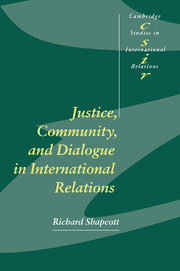Book contents
- Frontmatter
- Contents
- Acknowledgements
- Introduction
- 1 Beyond the cosmopolitan/communitarian divide
- 2 Community and communication in interpretive theories of international relations
- 3 Emancipation and legislation: the boundaries of conversation in poststructuralism and the critical theory of IR
- 4 Philosophical hermeneutics: understanding, practical reasoning and human solidarity
- 5 Philosophical hermeneutics and its critics
- 6 Towards a thin cosmopolitanism
- Conclusion
- Bibliography
- Index
- CAMBRIDGE STUDIES IN INTERNATIONAL RELATIONS
5 - Philosophical hermeneutics and its critics
Published online by Cambridge University Press: 22 September 2009
- Frontmatter
- Contents
- Acknowledgements
- Introduction
- 1 Beyond the cosmopolitan/communitarian divide
- 2 Community and communication in interpretive theories of international relations
- 3 Emancipation and legislation: the boundaries of conversation in poststructuralism and the critical theory of IR
- 4 Philosophical hermeneutics: understanding, practical reasoning and human solidarity
- 5 Philosophical hermeneutics and its critics
- 6 Towards a thin cosmopolitanism
- Conclusion
- Bibliography
- Index
- CAMBRIDGE STUDIES IN INTERNATIONAL RELATIONS
Summary
The principle that all are free can never again be shaken.
The account presented in the previous chapters argued for the principal contributions of philosophical hermeneutics to the development of a thin cosmopolitanism. However, philosophical hermeneutics is not without its critics, nor its own limitations and exclusions. Therefore, in order to build the case for a philosophical hermeneutic approach it is necessary to engage with these critics. Out of this engagement a better sense of the requirements of a cosmopolitanism encompassing the principles of communication can be determined and the case for a thin cosmopolitanism made stronger. This chapter examines the principal criticisms of philosophical hermeneutics and uses them to help formulate a more complete account of conversation.
The most relevant criticisms made against philosophical hermeneutics generally fall into two types. Perhaps the most longstanding, and common, of these arguments is that philosophical hermeneutics is essentially conservative. This charge is usually, but not exclusively, made from a critical theoretical perspective. Critical theorists also often make the related assertion that philosophical hermeneutics suffers from a form of philosophical idealism and is dismissive of, or blind to, material conditions which contribute to the formation of horizons of meaning. Philosophical hermeneutics has also been subjected to criticism from poststructuralists such as Jacques Derrida who charge that its arguments are embedded in a metaphysics of the will and, more importantly, that it privileges continuity over discontinuity and closure over disruption.
- Type
- Chapter
- Information
- Justice, Community and Dialogue in International Relations , pp. 180 - 208Publisher: Cambridge University PressPrint publication year: 2001



